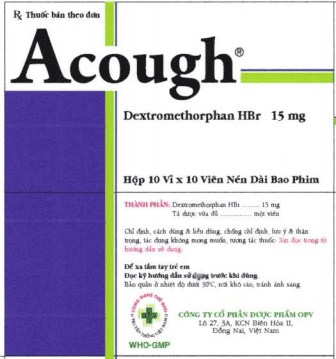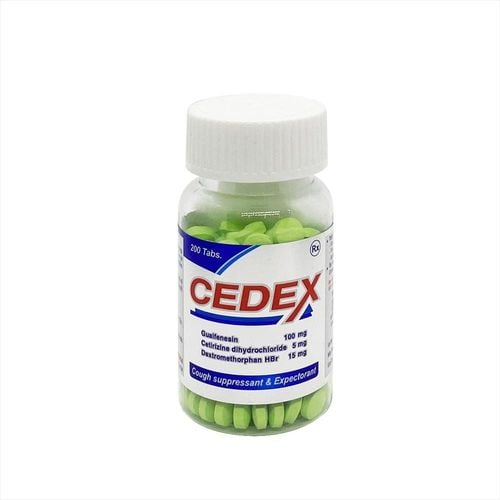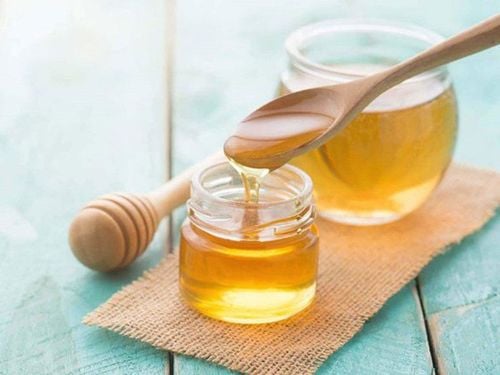This is an automatically translated article.
When comparing the effectiveness of the honey cough remedy with the use of cough medicines or antihistamines for upper respiratory infections, the results were astounding. The use of honey for cough can relieve or soothe the cough much better than those medicines.
1. What is a cough?
In general, coughing is a natural reflex of the body, helping the throat clear phlegm as well as other irritants. However, a persistent cough can be a noticeable sign and symptom of certain illnesses, such as viral infections, allergies, or bacterial infections.
Sometimes, a cough is not necessarily related to lung problems, many studies show that gastroesophageal reflux disease is also considered one of the main causes of cough.
You can treat coughs caused by allergies, colds, and sinusitis with a number of over-the-counter (OTC) medicines. For a cough caused by a bacterial infection, you may need antibiotics to treat it.
Besides using medicine, you can also consult your doctor about simple folk remedies for cough, such as honey for cough.
2. Cure cough with honey really effective?
Since ancient times, people have heard about how to cure cough with honey. In fact, honey cannot make your cough go away completely, but it is considered an effective remedy to soothe and reduce cough. This is because honey acts as a soothing agent for the mucous membranes in the throat, triggering a cough. In addition, honey also contains antioxidants and a number of other antibacterial properties, which play an important role in promoting the treatment of cough.
Although there is ample evidence to support the use of honey for coughs, studies have also shown that consuming one tablespoon of honey can help relieve cough-related symptoms in adults and children over 1 year old. year old.
When comparing the effectiveness of a honey cough remedy with the use of cough suppressants (dextromethorphan) or antihistamines (diphenhydramine) for nightly coughs due to upper respiratory tract infections in children who have showed amazing results. Specifically, the use of honey for cough can relieve or soothe the cough much better than the above medicines.
A recent study tested on 3 different types of honey, including eucalyptus flower honey, tangerine honey and labiatae honey, when used to treat coughs caused by respiratory infections. All of the above reduced the frequency and severity of coughs better than taking a placebo.
In addition, when children and adults treat cough with honey, the quality of sleep at night is significantly improved, less interrupted by coughs.

Chữa ho bằng mật ong cũng giúp chất lượng giấc ngủ vào ban đêm.
3. Who can use honey to treat cough?
These cough remedies often include combining honey with other treatments or simply using honey is enough.
In fact, honey is quite easy to find and has a relatively affordable price that is suitable for the "pocket of money" of the people. Furthermore, it is a cough remedy that does not pose any risk of drug interactions.
In addition to the risk of being allergic to honey, almost any adult can use honey for coughs or to help ease their annoying coughs. However, you absolutely should not give honey to babies under 12 months old, because it can cause botulism poisoning (a rare type of poisoning caused by poison attacking the nerves of the body). ).
Honey may contain Clostridium botulinum, which is a bacteria found in the soil. Normally, the digestive system of most adults can handle these spores, but the digestive system of infants is too immature, which can allow bacteria to grow and create toxins in the intestines. Botulisim poisoning can cause muscle weakness and breathing problems, requiring immediate medical attention.
In addition, healthcare professionals recommend that children under 6 years of age not use any cough or cold medicine until they have been shown to be safe and effective. It can even cause serious side effects. For children over 12 months old, you can completely give your baby honey to treat cough without worrying about their effects on children's health.
4. How to use honey to cure cough
To cure cough with honey, you can make your own remedy and relieve cough at home by steeping honey (about 2 teaspoons) with herbal tea, lemon or mixed with warm water.
In addition, you can also use honey to treat coughs by spreading them on bread or substituting sugar for some drinks. However, honey can add significant calories to the diet, so you should try to keep consuming no more than 6 teaspoons of honey per day.

Để chữa ho bằng mật ong, bạn có thể ngâm mật ong cùng với chanh hoặc nước ấm.
5. Other natural remedies for effective cough treatment
In addition to treating cough with honey, you can also ease the symptoms of a cough through the following other natural remedies:
Probiotics: These are microorganisms that help offers many impressive health benefits. Although they do not have the ability to relieve cough directly, they help balance the gastrointestinal microflora effectively. Thanks to this balance can support the function of the immune system throughout your body. Today, you can add probiotics to your diet to help support coughs through foods like yogurt, miso soup, kimchi, sauerkraut, sourdough, or alcohol. kefia. Mint leaves: Besides using honey as a cough remedy, you can also use mint leaves to soothe your throat as well as help clear your nose and remove mucus. Coughs and their symptoms can be greatly relieved by drinking peppermint tea or steaming with menthol. Thyme: This flowering plant is commonly used by many people to treat respiratory ailments. Some evidence suggests that thyme leaf extract combined with ivy can help relieve coughs and bronchitis in the short term. In fact, thyme leaves contain flavonoid compounds, which relax the muscles in the throat, thereby helping to reduce cough and inflammation. You can make thyme tea at home using 2 teaspoons of crushed thyme powder along with 1 cup of boiling water. After steeping thyme in boiling water for about 10 minutes, you can strain the grounds and enjoy the tea. Gargle with salt water: This is a simple remedy, helping you to soothe an itchy throat that causes a cough. You can mix 1⁄4 - 1⁄2 teaspoons of salt with about 235 ml of warm water.
6. How to prevent cough?
In addition to learning how to treat a cough, you should also arm yourself with some measures to help prevent this condition in the first place, including:
Get a yearly flu shot. Avoid contact with people who have a cough or cold. Cover your nose and mouth whenever you sneeze or cough. Drink plenty of water to ensure adequate supply of fluids needed by the body. Regularly clean common areas in your home, school or workplace. Need to clean the places you often come in contact with such as desks, phones, books. Remember to wash your hands often, especially after coughing, going to the toilet, eating or taking care of someone who is sick. If you have a cough due to allergies, you can minimize flare-ups by identifying the substances that affect you and avoiding exposure to them. Common allergens often include pollen, dust mites, plants, animal dander, insects, or mold. In addition, people at high risk of allergies should also be vaccinated to reduce the body's sensitivity to irritants.
Please dial HOTLINE for more information or register for an appointment HERE. Download MyVinmec app to make appointments faster and to manage your bookings easily.
References: Verywellhealth.com, Healthline.com, Mayoclinic.org












